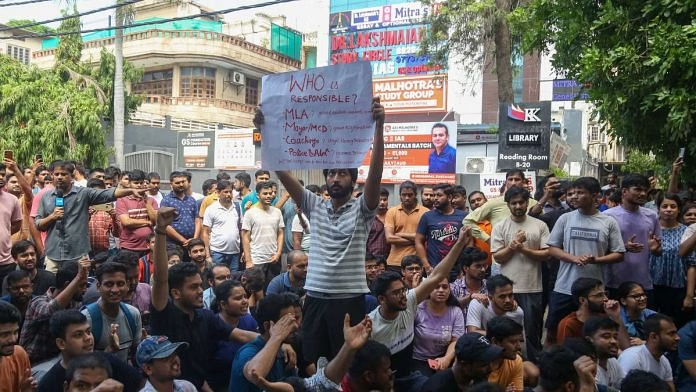In a development that has stirred both relief and controversy, the Central Bureau of Investigation (CBI) has reportedly cleared the SUV driver of any criminal charges related to the tragic deaths of several students at an IAS coaching centre. The incident, which shocked the nation, involved an SUV crashing into the coaching centre, leading to multiple fatalities and raising questions about accountability. However, the recent clearance of criminal charges against the driver has sparked a heated debate: Was justice truly served, or is this another case of a powerful cover-up?
While the CBI maintains that the driver was not criminally responsible for the deaths, many are questioning whether the investigation thoroughly examined all aspects of the case. The controversy surrounding this incident has once again highlighted the public’s concerns about the judicial process and how accountability is determined in cases involving loss of life.
The Incident: What Happened?
The tragedy unfolded at a popular IAS coaching centre, where aspiring civil service candidates were attending classes. In a freak accident, an SUV reportedly lost control and crashed into the building, causing structural damage that led to a collapse. Several students were trapped under the debris, and despite rescue efforts, some lost their lives. The driver of the SUV was initially arrested and faced multiple criminal charges, including negligent driving and culpable homicide not amounting to murder.
However, the driver maintained that the accident was the result of mechanical failure rather than any deliberate or reckless action on his part. The case was soon handed over to the CBI for further investigation, given the high-profile nature of the incident and the public outcry for a thorough and impartial probe.
The CBI’s Investigation: Lack of Accountability or Fair Judgment?
After months of investigation, the CBI has cleared the driver of all criminal charges, stating that their inquiry revealed no evidence of criminal intent or negligence on the driver’s part. According to sources close to the investigation, the crash was determined to be the result of an unavoidable mechanical failure, which absolved the driver of direct responsibility for the deaths.
The CBI’s report further stated that the SUV had a history of mechanical issues, which had not been addressed prior to the accident. The investigation also noted that the coaching centre’s building structure was not up to safety standards, contributing to the collapse following the crash.
But while the CBI has exonerated the driver, many are left wondering if this decision truly serves justice, especially for the families of the deceased. Is this exoneration the result of a thorough investigation, or does it indicate a failure to hold the right people accountable?
Families of Victims: Is This Justice?
The families of the students who died in the tragic incident are understandably distraught over the CBI’s decision. Many of them feel that clearing the driver of criminal charges fails to address the accountability they were seeking. “We have lost our children, and now we are being told that no one is to blame. How can this be justice?” asked one grieving parent during a protest.
While the CBI may have found mechanical failure to be the primary cause, victims’ families are questioning why such failures were allowed to go unchecked. Who is responsible for ensuring vehicles on the road are in working condition? And why wasn’t the coaching centre held accountable for its failure to comply with safety standards?
Public Reaction: Outrage or Relief?
The decision to clear the driver has sparked a divided public response. Many people are outraged, claiming that the ruling reflects a broader issue of accountability within India’s justice system. “If the driver is not to blame, then who is? Why do these incidents keep happening, and no one is ever held responsible?” questioned one social media user. The ruling has raised concerns about public safety, as many believe that someone should be held accountable for the systemic failures that led to the tragedy.
However, others have expressed relief at the driver’s exoneration, arguing that freak accidents happen and that it would be unjust to ruin a person’s life over a mechanical failure beyond their control. “The CBI investigated thoroughly. If the evidence shows that the driver wasn’t at fault, then we should accept that,” said another.
This divide reflects a larger tension within Indian society, where issues of justice, responsibility, and institutional failure often clash with public perception.
Larger Questions: The Role of Regulation and Oversight
The incident has also brought to light broader questions about vehicle safety and building regulations in India. If mechanical failure was the root cause of the crash, then why wasn’t the vehicle inspected more rigorously? And if the coaching centre’s structural integrity was questionable, why wasn’t it held accountable?
Critics are arguing that the exoneration of the driver points to a systemic failure on the part of regulatory authorities, who allowed unsafe vehicles and buildings to operate without proper checks. “This isn’t just about one driver—it’s about an entire system that fails to protect people,” said a legal expert.
Is This the End of the Story?
For now, the CBI has closed its investigation into the driver, but the fallout from the incident is far from over. The families of the victims have vowed to continue fighting for justice, and public outcry over the case may push for further scrutiny of both vehicle safety regulations and building standards across the country.
Whether the CBI’s decision to clear the driver was a fair assessment or a failure to hold the right people accountable, this tragic incident has exposed glaring gaps in public safety and accountability. The question remains: Is justice being served, or is the real issue being swept under the rug?

